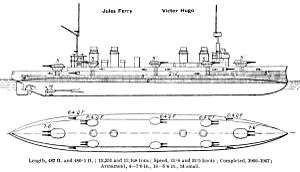Léon Gambetta-class cruiser
 Léon Gambetta | |
| Class overview | |
|---|---|
| Name: | Léon Gambetta-class criser |
| Operators: |
|
| Preceded by: | Gloire class |
| Succeeded by: | Jules Michelet |
| In commission: | 1903–28 |
| Completed: | 3 |
| Lost: | 1 |
| Scrapped: | 2 |
| General characteristics | |
| Type: | Armoured cruiser |
| Displacement: | 12,400 tonnes (12,204 long tons) |
| Length: | 149.1 m (489 ft 2 in) |
| Beam: | 22.5 m (73 ft 10 in) |
| Draft: | 8.2 m (26 ft 11 in) |
| Installed power: |
|
| Propulsion: | 3 shafts; 3 triple-expansion steam engines |
| Speed: | 22.5 knots (41.7 km/h; 25.9 mph) |
| Complement: | 728 men |
| Armament: |
|
| Armour: |
|
The Léon Gambetta-class cruisers were a group of three armored cruisers built for the French Navy during the first decade of the 20th century.
Description

The Léon Gambetta-class ships were designed as enlarged and more powerful versions of the Gloire-class armored cruisers. Their crew numbered 728 officers and enlisted men, or 821 when serving as a flagship. The ships measured 149.1 meters (489 ft 2 in) overall, with a beam of 22.5 meters (73 ft 10 in) and a draft of 8.2 meters (26 ft 11 in)[1] Designed to displace 12,351 metric tons (12,156 long tons), they actually displaced 11,959 to 13,108 metric tons (11,770 to 12,901 long tons).[2]
The ships had three vertical triple-expansion steam engines, each driving one propeller shaft. The engines were rated at a total of 27,500 indicated horsepower (20,500 kW), using steam provided by 20 or 28 water-tube boilers. They had a designed speed of 22.5 knots (41.7 km/h; 25.9 mph).[2] They carried up to 2,065 long tons (2,098 t) of coal and could steam for 12,000 nautical miles (22,000 km; 14,000 mi) at a speed of 10 knots (19 km/h; 12 mph).[1]
The main armament of the Léon Gambetta-class cruisers consisted of four 194 mm (7.6 in) guns mounted in twin-gun turrets fore and aft of the superstructure. Their intermediate armament was sixteen 164 mm (6.5 in) guns. Twelve of these were in twin-gun turrets on the sides of the ship and the other four were in casemates. For anti-torpedo boat defense, they carried twenty-four 47 mm (1.9 in) Hotchkiss guns. They were also armed with two[2] or four submerged 450-millimeter (17.7 in) torpedo tubes.[1]
The waterline armored belt of the Léon Gambettas was 150 millimeters (5.9 in) thick amidships and tapered to 70 millimeters (2.8 in) towards the bow and stern. The conning tower had armored sides 200 millimeters (7.9 in) thick. The main-gun turrets were protected by 200 millimeters (7.9 in)[1] of armor and the intermediate turrets by 130–160 millimeters (5.1–6.3 in). The casemates had armor 140 millimeters (5.5 in) thick.[2]
Ships
The ships were named after notable statesmen of the French Republic. The Minister of the Navy from 1902 to 1905, Camille Pelletan, chose these names for the armoured cruisers in order to honour left-wing statesmen, philosophers or historians, such as Waldeck-Rousseau, Jules Michelet, Ernest Renan, or Edgar Quinet, as the officers of the French Navy (so called "La Royale") were reputed to have rather right-wing Royalist sympathies. Under his authority, and for the same reason, six battleships were given names as République, Patrie, Démocratie, Justice, Liberté, or Vérité.
- Léon Gambetta was torpedoed and sunk in 1915.
- Jules Ferry served until 1927.
- Victor Hugo until 1928.
References
Bibliography
- Chesneau, Roger & Kolesnik, Eugene M., eds. (1979). Conway's All the World's Fighting Ships 1860–1905. Greenwich: Conway Maritime Press. ISBN 0-8317-0302-4.
- Silverstone, Paul H. (1984). Directory of the World's Capital Ships. New York: Hippocrene Books. ISBN 0-88254-979-0.
- Sondhaus, Lawrence (2014). The Great War at Sea: A Naval History of the First World War. Cambridge: Cambridge University Press. ISBN 978-1-107-03690-1.
External links
